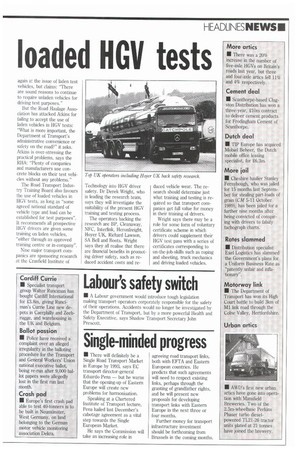loaded GV tests
Page 7

If you've noticed an error in this article please click here to report it so we can fix it.
again at the issue of laden test vehicles, but claims: "There are sound reasons to continue to require unladen vehicles for driving test purposes."
But the Road Haulage Association has attacked Atkins for failing to accept the use of laden vehicles in HGV tests: "What is more important, the Department of Transport's administrative convenience or safety on the road?" it asks. Atkins is over-stressing the practical problems, says the RHA: "Plenty of companies and manufacturers use concrete blocks on their test vehicles without any problems."
The Road Transport Industry Training Board also favours the use of loaded vehicles in HGV tests, as long as "some agreed national standard of vehicle type and load can be established for test purposes". It recommends all prospective HGV drivers are given some training on laden vehicles, "either through an approved training centre or in-company".
Nine major transport companies are sponsoring research at the Cranfield Institute of Technology into HGV driver safety. Dr Derek Wright, who is leading the research team, says they will investigate the suitability of the present HGV training and testing process.
The operators backing the research are BP, Cleanaway, NFC, Interlink, Heronfreight, Hoyer UK, Richard Lawson, SA Bell and Boots. Wright says they all realise that there are financial benefits in promoting driver safety, such as reduced accident costs and re duced vehicle wear. The research should determine just what training and testing is required so that transport companies get full value for money in their training of drivers.
Wright says there may be a role for some form of voluntary certificate scheme in which drivers could supplement their HGV test pass with a series of certificates corresponding to on-the-job-skills such as roping and sheeting, truck mechanics and driving loaded vehicles.




















































































































































